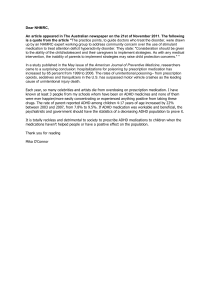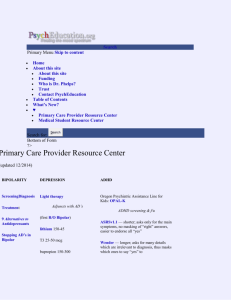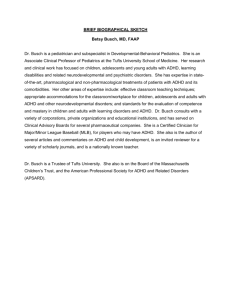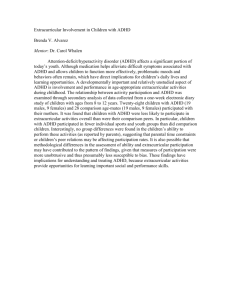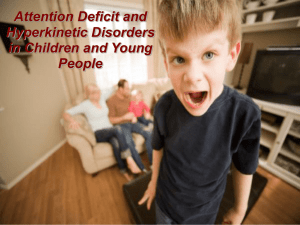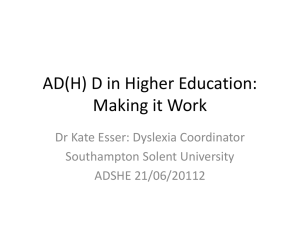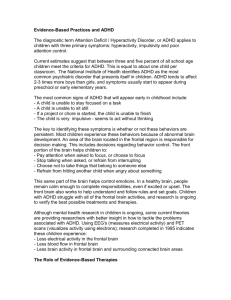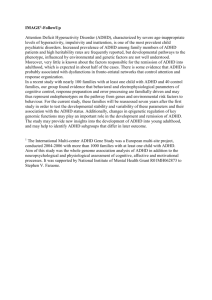Did You Say I Need Testing for ADHD/ADD?
advertisement
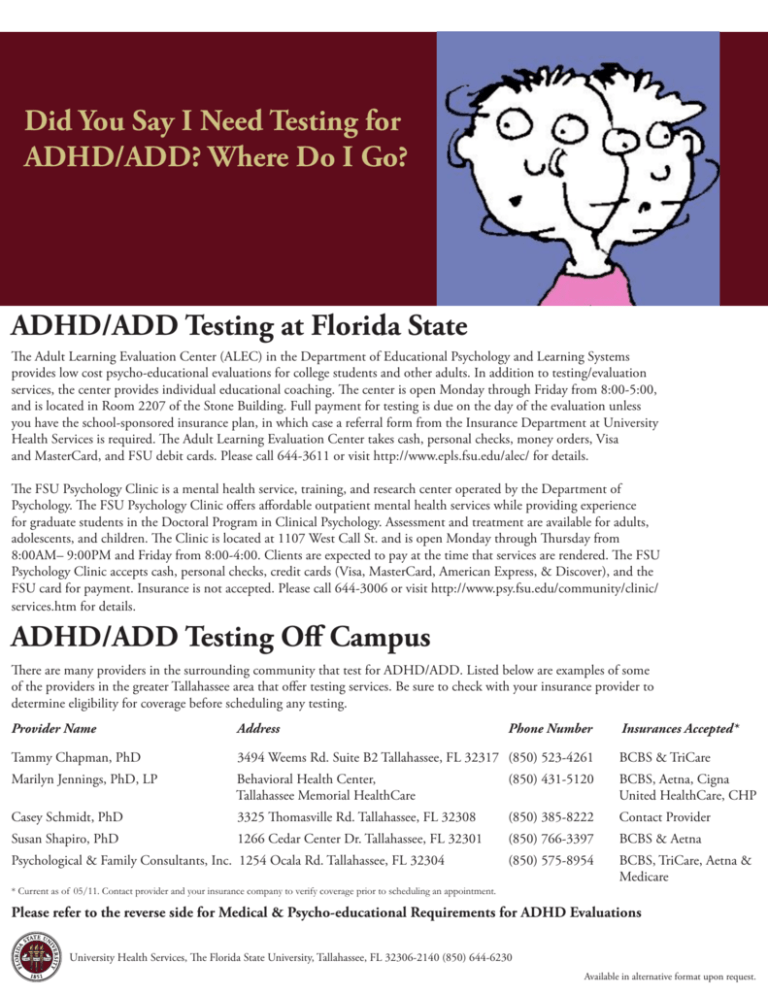
Did You Say I Need Testing for ADHD/ADD? Where Do I Go? ADHD/ADD Testing at Florida State The Adult Learning Evaluation Center (ALEC) in the Department of Educational Psychology and Learning Systems provides low cost psycho-educational evaluations for college students and other adults. In addition to testing/evaluation services, the center provides individual educational coaching. The center is open Monday through Friday from 8:00-5:00, and is located in Room 2207 of the Stone Building. Full payment for testing is due on the day of the evaluation unless you have the school-sponsored insurance plan, in which case a referral form from the Insurance Department at University Health Services is required. The Adult Learning Evaluation Center takes cash, personal checks, money orders, Visa and MasterCard, and FSU debit cards. Please call 644-3611 or visit http://www.epls.fsu.edu/alec/ for details. The FSU Psychology Clinic is a mental health service, training, and research center operated by the Department of Psychology. The FSU Psychology Clinic offers affordable outpatient mental health services while providing experience for graduate students in the Doctoral Program in Clinical Psychology. Assessment and treatment are available for adults, adolescents, and children. The Clinic is located at 1107 West Call St. and is open Monday through Thursday from 8:00AM– 9:00PM and Friday from 8:00-4:00. Clients are expected to pay at the time that services are rendered. The FSU Psychology Clinic accepts cash, personal checks, credit cards (Visa, MasterCard, American Express, & Discover), and the FSU card for payment. Insurance is not accepted. Please call 644-3006 or visit http://www.psy.fsu.edu/community/clinic/ services.htm for details. ADHD/ADD Testing Off Campus There are many providers in the surrounding community that test for ADHD/ADD. Listed below are examples of some of the providers in the greater Tallahassee area that offer testing services. Be sure to check with your insurance provider to determine eligibility for coverage before scheduling any testing. Provider Name Address Phone Number Tammy Chapman, PhD 3494 Weems Rd. Suite B2 Tallahassee, FL 32317 (850) 523-4261 BCBS & TriCare Marilyn Jennings, PhD, LP Behavioral Health Center, (850) 431-5120 Tallahassee Memorial HealthCare BCBS, Aetna, Cigna United HealthCare, CHP Casey Schmidt, PhD 3325 Thomasville Rd. Tallahassee, FL 32308 (850) 385-8222 Contact Provider Susan Shapiro, PhD 1266 Cedar Center Dr. Tallahassee, FL 32301 (850) 766-3397 BCBS & Aetna Psychological & Family Consultants, Inc. 1254 Ocala Rd. Tallahassee, FL 32304 (850) 575-8954 * Current as of 05/11. Contact provider and your insurance company to verify coverage prior to scheduling an appointment. Insurances Accepted* BCBS, TriCare, Aetna & Medicare Please refer to the reverse side for Medical & Psycho-educational Requirements for ADHD Evaluations University Health Services, The Florida State University, Tallahassee, FL 32306-2140 (850) 644-6230 Available in alternative format upon request. University Health Services Medical and Psycho‐educational Requirements for ADHD Evaluations Patients of this facility who wish to receive services for Attention Deficit Hyperactivity Disorder must provide their clinician with appropriate documentation. The following criteria must be met: A. For Psycho‐Educational Evaluations: 1. A qualified diagnostician must conduct the evaluation. In most cases, this would be a professional trained in the administration of psychometric testing. The evaluator should be capable of conducting an evaluation that renders a differential diagnosis of ADHD including any co‐existing conditions such as mood, anxiety and learning disorders or gifted intelligence. 2. Documentation must be current. In most cases, this means that the diagnostic evaluation must have been completed within the past five years. 3. A report of academic history must be included. Developmental disabilities such as ADHD are usually evident during early childhood (although not necessarily diagnosed). Information regarding academic and behavioral functioning in elementary and secondary education should be provided. Self‐report by the patient alone is not sufficient. Accompanying historical documentation that validates the symptoms must be included (old report cards, parental and/or other relevant persons’ statements that validate this information). 4. The diagnostic criteria from the DSM IV should be used as the criteria for the diagnosis. 5. Assessment Instruments used to conduct the evaluation should be norm referenced and designed to accurately assess attention problems. These include but are not limited to: a. Woodcock‐Johnson III Tests of Achievement b. Woodcock‐Johnson III Tests of Cognitive Abilities c. Current Symptoms Scale – Self‐Report Form: Other Report Form* d. Childhood Symptom Scale – Self‐Report Form; Other Report Form* e. Work Performance Rating Scale – Self Report Form* f. Employment History Rating Scale* g. Developmental History Rating Scale* h. Social History Rating Scale* i. Michigan Alcohol Screening Test *Forms from Barkley & Murphy (1998) The report summary should integrate the assessments in a manner that validates or invalidates the diagnosis of ADHD and its subtype. Additionally there should be a statement that summarizes whether or not there are ADHD symptoms that cause current impairments. If there are impairments, the statement should address whether or not they are substantial, chronic and exist across settings. B. For Medical Evaluations: 1. Appropriate psycho‐educational evaluation supporting the diagnosis of ADD/ADHD (see above.) 2. A personal medical, family history and physical exam. 3. Appropriate lab work prior to onset of medication and annually as determined by the clinician. May include a urine drug screen. 4. Pre‐medication EKG. 5. Generally ongoing monthly follow‐up or an alternate schedule as determined by their clinician. C. For Both Types of Evaluations: Review and signature of the Information Concerning ADHD/ADD Medications for Students (separate document.)
